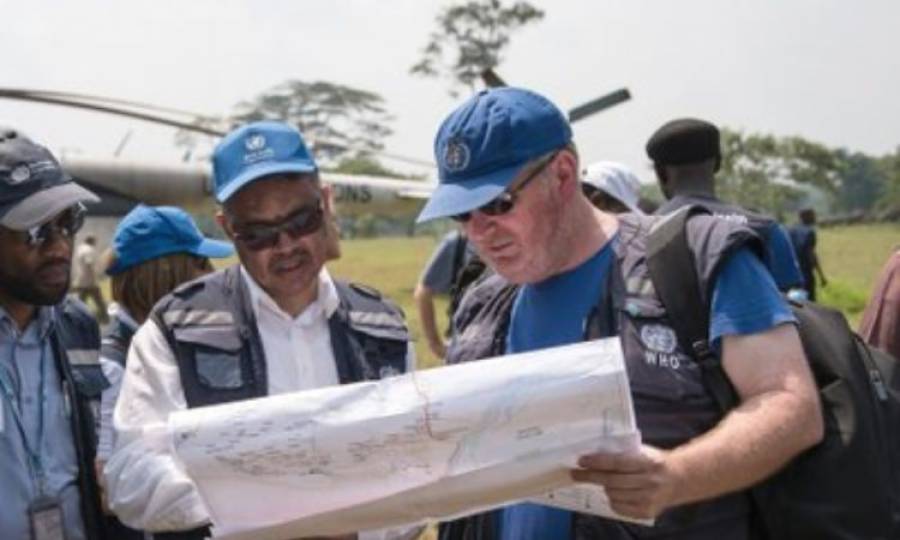Murad, Dr Michael Ryan discuss flood situation, emerging public health threats

KARACHI: Syed Murad Ali Shah, Chief Minister of Sindh, and Dr Michael Ryan, Executive Director of the Health Emergency Programme (WHE), discussed the overall flood situation, urgent needs, and emerging threats to public health and agreed to work together to prevent water-borne diseases.
WHO Head of Mission in Pakistan Dr Palitha Mahipala, Director HQ Dr Mike Ryan, Executive Director Dr Richard Brendan, Senior Emergency Officer Robert Holden, Incident Manager Dr Micheal Lukwiya, Communication Officer Muneera Al Mahdi, WHO Head of Sub-Office, Sindh Dr Sara Salman, and Team Leader, Polio Program Dr Asif Ali Zardari attended the meeting held at CM House.
Azra Fazal Pechuho, Chief Secretary Sohail Rajput, Secretary of Health Zulfiqar Shah, and Secretary to the CM Raheem Shaikh supported the chief minister.
Executive Director Dr Michael informed the chief minister that the WHO Mission had taken an overhead view of the flooded area and visited disaster-stricken districts in the province to assess the situation.
According to the chief minister, the extraordinary rainfall and mountainous torrents flooded 18.8 per cent or 12,541.6 square kilometres of the province's total population, displacing 7.2 million people.
Approximately 400 thousand individuals were housed in 2,782 relief camps established across the province.
Drs. Rayan and Mahipala lauded the Sindh government's efforts to provide rescue and relief services. However, they emphasised the need for more significant coordinated efforts between partners and local non-governmental organisations in Health and district management.
The chief minister reported that 410 medical camps, including mobile [camps], have been formed with 600 physicians, 1125 paramedics, and 350 volunteers.
The chief minister and the WHO Mission examined the severity and scope of the impending health and nutrition issue.
As a result, the group determined to take actual actions for the health protection of flood victims, provide shelter, food, and potable water, and reach every person in need.
Murad Ali Shah said that 96658 instances of diarrhoea in children younger than five years were treated in September alone. In addition, 16701 cases of dysentery and eight cases of cholera have been treated among youngsters.
While discussing Malaria, Murad Ali Shah stated that on September 28, the provincial health department screened 20623 patients and detected 2,942 Malaria cases, including 1960 in the Hyderabad division, 1,375 in Larkana, 989 in Mirpurkhas, 354 in Sukkur, 148 in Shaheed Benazirabad, and 116 in Karachi.
He stated that 3,869 people were checked, and 6,603 tested positive for Dengue. Azra, minister of health, said that 9 172 dengue cases had been identified in 2022.
Regarding maternal health, Azra stated that 9,829 pregnant women were living in camps, of which 9,010 received dietary supplements, and 7,897 received Tetanus Toxoids (TT) and Tetanus-Diphtheria vaccines (TD). There have been 3,756 deliveries done.
Dr Rayan said that water and vector-borne disease outbreaks threatened an increase in mortality. Concerning malnutrition and women who are pregnant, the delegates addressed immediate actions.
The WHO provided full cooperation in developing coordination and assistance for the supply of safe drinking water and disease-resistant infrastructure. Surveillance and response system, enhancing health services, providing medicines and supplies, treating malnutrition, and access to health services.
The World Health Organization (WHO) has created four Emergency Operations Centers in Sindh to respond to flood situations and to collaborate closely with the Department of Health and District Administration.
WHO assists the government of Sindh in establishing 50 Nutrition Stabilisation Centers, bolstering the health system by providing vital health services, and renovating/refurbishing health facilities.
WHO had given Dadu and Kambar-Shahdadkot 12 boats and 27 vehicles for outreach health services, distribution of Aqua Tablets, and water purification systems.
Trending
Popular
Sindh pledges vigorous action to prevent poliovirus transmission
-
PMA stresses health equity on World ...
04:08 PM, 9 Apr, 2024 -
Dow University’s new rabies vaccine ...
12:18 PM, 28 Mar, 2024 -
IRD role lauded in advancing ...
02:53 PM, 12 Mar, 2024 -
Over one billion people worldwide ...
09:48 AM, 5 Mar, 2024




